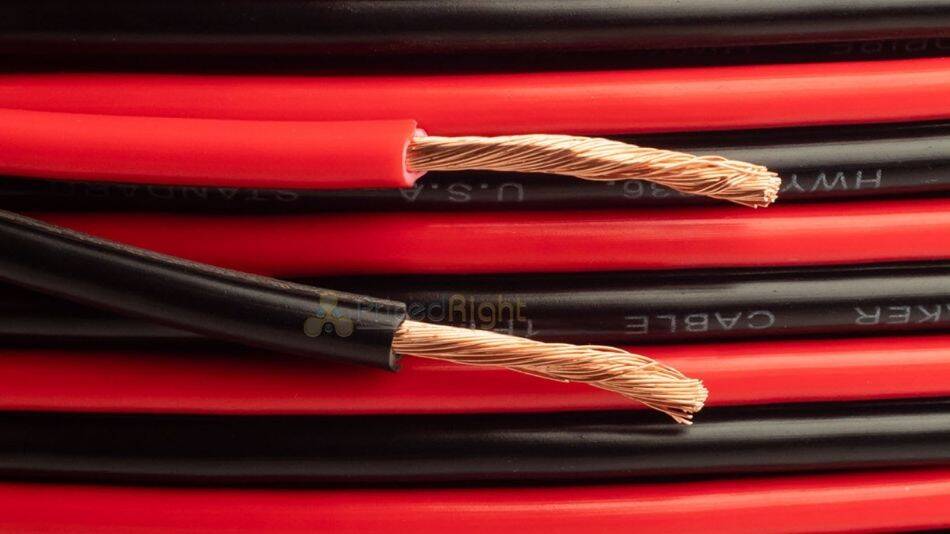
Speaker wires do not come as an accessory to the speakers we buy. This means it is up to you to choose the right speaker wire for driving your speakers. You can decide to buy a speaker wire with connectors already attached or one without connectors so that you DIY.
No matter the type of speaker wire you choose to go in for, it is crucial that the speaker wire you use is good enough to provide a good quality path for the flow of audio signals between your speakers and amplifiers. When looking at the quality of a speaker wire, some of the things to consider are the thickness, material makeup, the length of the wire, among others.
Due to the deficient information and confusion surrounding speaker wires, I will address issues about speaker wires.
Table of Contents
Can a speaker wire be too thick?
Speaker wire cannot be said to be too thick. Having a thick speaker wire is nothing to worry about. The thicker the speaker wire, the lower the resistance it presents to the current flow. This means thicker speaker wires allow for more current to pass through.
When going in for a speaker wire, it is necessary to select a speaker wire with the right thickness (gauge) for your system. The thickness of a speaker wire is determined by the diameter of the inner cables and not that of the surrounding insulation.
The thickness of speaker wires can range from 12 – 18 gauge. This number range is known as its American Wire Gauge (AWG) number. This gauge refers to the thickness of the copper wire in the speaker wire.
Lower wire gauge numbers mean the speaker wire is thicker. Conversely, higher wire gauge numbers mean the speaker wire is thinner. Simply put, a 12-gauge wire is thicker than an 18-gauge wire.
This means a speaker with a wire gauge of 12 is very thick. The lower the gauge number, the thicker the speaker wire. A thicker speaker wire means a lower or less resistance to current flow.
Thick speaker wire is usually recommended for long-distance wire runs and driving low-impedance speakers as well. Hence, thicker speaker wires are suitable for low impedance speakers of around 4 ohms and high power amplifiers of 250 watts of power or above.
Generally, thicker speaker wires are said to be slightly better than thin wires. This is because using them helps to enhance damping and prevent power loss as well. Thicker speaker wires allow a more efficient transfer of power to speakers.
However, thick speaker wires are usually more expensive, relatively heavier, and not so easy to bend. They are also known to be more durable. You might also not be able to fit a particular connector to it if it is too thick.
Is it safe to cut speaker wires?
It is perfectly fine and safe to cut speaker wires. However, when cutting speaker wires, you need to make sure they are not connected to any device or power source.
When you purchase a bundle of speaker wires, there is the need to cut it down to sizeable lengths. At other times, a change in location or environment might require that you alter or cut your old speaker wires. This will mean exposing the metal wires inside the insulated plastic casing before work can be done on it.
If there is the need to cut a speaker wire, it is best if the wire is not hooked up to any speaker or the powered amplifier’s output.
Therefore, to safely cut a speaker wire, you have to first unplug the wire before cutting it. Cutting of speaker wires can be done with a pair of plier-style wire cutters or even a knife or scissors.
To determine how much speaker wire length you need, I will advise that you first measure the distance you will be running your wire through. You can do this by running a rope or string from your amplifier’s location to your speaker location.
Always remember that an extra room of allowance must then be added to your measurement to cater for any slacks.
Doing this can help you avoid unnecessary cutting and joining of speaker wires that might result from a poor estimation of the wire length required for your setup.
Also: Can Speaker Wire Shock You? All You Need to Know
Does a speaker wire go bad with age?
Speaker wires do not go bad with age. Speaker wires are known to have a long lifespan. As long as speaker wires are well looked after, speaker wires will last for many decades without them degrading. Frequent use or aging will not cause them to go bad.
However, there is one reason why speaker wires might go bad with time. We can attribute this problem to poor care of speaker wires. Speaker wires can go bad as a result of the deterioration of exposed copper parts of the wires. Bare copper wires exposed to the environment become heavily oxidized and corroded over time, turning black or green.
This will increase the resistance of such wires, thereby affecting their conductivity. A less conductive wire means poor sound quality.
Speaker wires that stay connected to speakers and amplifiers for many years can also be affected by oxidation. Oxidation of the copper in such speaker wires can occur at the connector points as well. Due to this, it is recommended that you unplug and re-plug your wires once in a while.
When a speaker wire is in such condition, you can remove the oxidized portion of copper from the wire by stripping the insulation back a few inches. In most cases, after doing this, you would still find the bright copper wire. This means such speaker wires are still in good condition and can be used to drive speakers.
It’s also a good idea to clean all connection points of speaker wires once in a while. Cleaning all connection points will leave you with a nice, clean, and fresh-looking copper. This will help prevent these connection portions from being oxidized.
It is worth noting that most modern commercial speaker wires are relatively durable than those of previous years. Thankfully, the improvement in the quality of copper used in manufacturing these speaker wires has helped prolong the already long lifespan of speaker wires.
This is because these modern speaker wires are made with oxygen-free copper. Oxygen-free copper is less susceptible to corrosion. This makes oxygen-free copper much better than the old kind of copper. If you need your speaker wires to last for a long while, make sure you go in for an oxygen-free wire.
Can a speaker wire be used as remote wire?
Speaker wires can be used as remote wires. It doesn’t matter what kind of wire you use for a remote wire. Any copper wire will work when used as a remote wire. Since most speaker wires are made of copper metal, they can be used for remote wiring.
Remote wiring is mostly found in vehicles. A remote wire is used to connect the stereo unit to an amplifier in vehicles. Remote wires enable the amplifier to power the speakers and themselves. Amplifiers are usually added to car audio systems to provide extra power for the speakers.
Remote wires are used to create an extended switch that is connected to a power source or battery. The amplifier only turns on if the remote wire is touching the power source or if the remote wire switch is turned on. Remote wires provide 12 volts of power when turned on.
Can you use thin wire for speakers?
Thin wires can be used to drive speakers. When using a thin wire to drive a speaker, the distance between the amplifier and the speaker must be considered. Thin wires can be used to drive speakers that are located very close to amplifiers.
As I mentioned earlier, speaker wires with higher gauge numbers are said to be very thin. If your speaker wire is too thin, it will have a lot of resistance. Resistance is proportional to how thick or thin your speaker wire is. Thin wires have a relatively higher resistance than thick wires.
Due to this, thinner wires should not be used for running long-distance setups. Running thin wires over a long distance can cause you to lose some amount of power, hence affecting the quality of sound. Owning to the fact that thin wires have high resistance, they can melt if a large current is put through them. This can lead to damage to your amplifier.
Can speaker wire be too long?
Speaker wires can definitely be too long. Ideally, the maximum length a speaker wire should be run through is about 50 feet. Anything above 50 feet is considered too long. The length of the run of speaker wires from amplifiers to speakers affects the quality of the sound produced by a system.
This means that, though the thickness of the wire matters, the distance over which it covers is also important. Speaker runs of more than 50 feet should be avoided even if the wire thickness is adequate. This is because the more the distance of the run increases, the less quality the audio becomes.
It is worth noting that speaker wires with lower gauges/thick wires are best for connections that require longer runs from the audio amplifier to the speakers.
With thicker speaker wires, the resistance of the wires is low, which allows you to run these wires over longer lengths and distances. Using thicker speaker wires over long distances can actually help reduce or avoid power loss and damping. For long runs, speaker wires with thicker wires are also better at reducing the effects of resistance on the signal generated.
Conclusion
The most important thing to consider when going in for a speaker wire is your speaker wire thickness/gauge. The thickness of the speaker wire you will need for your setup should be compatible with; your amplifier output rating, Ohm rating of speakers, and the length needed to run your setup.
However, despite reviews and opinions about thicker speaker wires being better than thinner ones, it is important to know that there is no need to spend more money on extremely bigger speaker wires than you need. Just get one whose thickness is compatible with the equipment you will run them with, that’s all.

Hello, I’m Elijah. A writer on Geek Musician, based in Ghana-West Africa. I am a writer with a passion for research and reading. I usually spend my free time playing chess or watching movies. For more info, check out my about me page. Or read more of my articles here.
